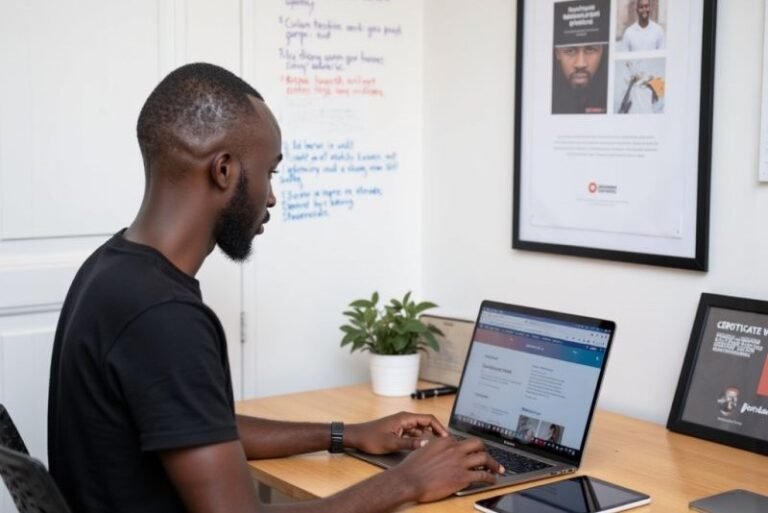From Confused to Booked: Effective Freelance Positioning for Success
Freelancing offers unparalleled freedom, but standing out as a freelancer in today’s crowded market can be challenging. Many freelancers find themselves overwhelmed, unclear on how to attract clients, or frustrated by a lack of consistent work. The key to overcoming these challenges lies in effective freelance positioning.
By positioning yourself correctly, you not only clarify your expertise but also attract the right clients. Here’s how to get from “confused” to “booked” with a clear freelance positioning strategy.
1. Master Your Niche
The first step to strong positioning is narrowing down your niche. Freelancers who try to do everything end up doing nothing. Instead of being a “jack-of-all-trades,” focus on a specific skill or industry.
For example, instead of offering “web design,” narrow it down to “web design for small e-commerce businesses.” This makes your services more targeted, helping you stand out as an expert in that area.
Key Takeaway: By mastering one specific niche, you’ll be able to cater to a specific group of clients, making you more appealing to them.
2. Communicate Your Unique Value Proposition (UVP)
Your unique value proposition (UVP) is what sets you apart from others in your niche. Ask yourself, “What makes my service different? Why should someone hire me over the competition?”
Your UVP can be your specialized skill set, your customer service, or even your ability to work within a specific timeframe. A strong UVP is critical for effective freelance positioning, as it helps clients understand why you’re the best fit for their project.
Your UVP should be clearly stated in all of your marketing materials, including your website, social media profiles, and portfolio.
3. Build a Personal Brand
Personal branding is the process of shaping how others perceive you as a freelancer. A strong personal brand helps build trust, demonstrate your expertise, and attract ideal clients.
Start by showing up regularly on platforms like LinkedIn, X, or Instagram. Share your knowledge, post about your process, and showcase your work. The more you share and engage, the more visibility you gain.
A consistent personal brand positions you as a thought leader in your field and helps you connect with clients who resonate with your values and expertise.
4. Create a Portfolio That Reflects Your Niche
Your portfolio is your best sales tool. Make sure it’s focused on the services and projects that align with your niche. This helps you attract the right clients while also establishing yourself as an expert in your area.
For example, if your niche is web design for local businesses, your portfolio should include web design projects for local businesses, complete with case studies and client testimonials. Don’t forget to make your portfolio easy to navigate and visually appealing.
5. Set Clear Pricing and Packages
Clear pricing shows clients you’re a professional who values their time and yours. Don’t hide behind hourly rates or vague proposals. Instead, offer service packages that detail exactly what clients will receive and at what cost.
For example, instead of charging per hour for web design, you can offer a package that includes design, SEO optimization, and post-launch support for a set price. Having clear pricing will build trust with potential clients and streamline the hiring process.
Tip: Don’t be afraid to charge what you’re worth. Positioning yourself as an expert means charging accordingly.
6. Leverage Testimonials and Case Studies
Client testimonials and case studies are incredibly powerful for building trust. After you’ve worked with a few clients, ask them for testimonials and gather results from your projects.
Case studies are also helpful to show potential clients how you’ve solved specific problems for others. For instance, if you helped a local bakery increase their online sales through a website redesign, showcase that in a detailed case study.
These pieces of social proof will demonstrate that you’re capable of delivering results and provide reassurance to potential clients.
7. Stay Consistent and Keep Evolving
Freelance positioning is not something you do once and forget about. Consistency is key. Keep showing up, refining your messaging, and evolving with the industry.
Positioning yourself as a successful freelancer requires ongoing work. Continue learning, building your expertise, and refining your services. The more you grow, the stronger your position becomes in the market.
Tip: Don’t try to do everything. Focus on continually offering value in the areas where you’re most skilled.
Final Thoughts: Freelance Positioning is Your Secret Weapon
Effective freelance positioning isn’t a one-time effort—it’s an ongoing process that allows you to clarify your niche, attract your ideal clients, and command higher rates for your services. By focusing on mastering your niche, communicating your unique value, building a strong personal brand, and setting clear pricing, you’ll have the tools you need to go from “confused” to “booked.”
If you’re looking for more tips on how to build your freelance business, check out our resources on personal branding and freelancing. Ready to take your freelance career to the next level? Start positioning yourself for success today.
Internal Links:






